read
Here’s how to do it properly
The success of your PPC campaigns relies on good keywords. The right keywords are essential. No surprises there. That said, most of the ‘keyword research guides’ you’ll find out there are pretty much aimed exclusively at organic SEO keyword research, and not keyword research for PPC.
Sure, there are similarities in identifying the right keywords for SEO & PPC but if you are planning to use Google Adwords or Bing Ads then you’d be wise too to plan a better approach – a less organic SEO and more PPC specific approach.
Let’s take a quick look at one common PPC keyword misconception – the advice that you should leave Head Keywords/Single Word keywords and focus only on 2-3 word long phrases.
There are two problems with this approach:
1.) Not all keywords are the same and some one word expressions will define the user’s intent precisely. Whilst ‘mechanic’ is broad, the words ‘plumber’ or ‘locksmith’ clearly define exactly the type of service the user looking for.
There are plenty of other examples, eg. a keyword like ‘editing’ is too broad. Editing could refer to video, image, or essay editing. ‘Proofreading’ on the other hand defines the service exactly.
The lesson here? It’s not how long they are… it’s what you do with them. IN other words, don’t trust advice that categorizes keywords based solely on length.
2.) Secondly – breadth. I wouldn’t encourage anybody to do organic SEO on a broad term like ‘plumber’ – it’s simply far too broad.
In the world of PPC world you can though make restrictions geographically and if you setup your campaigns correctly (eg. campaigns within a 10 or 15 mile radius from your business address) then a broad term like ‘plumber’ makes perfect sense. In fact, I positively encourage you to advertise for the exact term ‘plumber’ and let Google put you in front of all those self-qualified searchers. As you can see in the picture below Google shows local plumbers and plumber networks (near Salford, UK in the example)
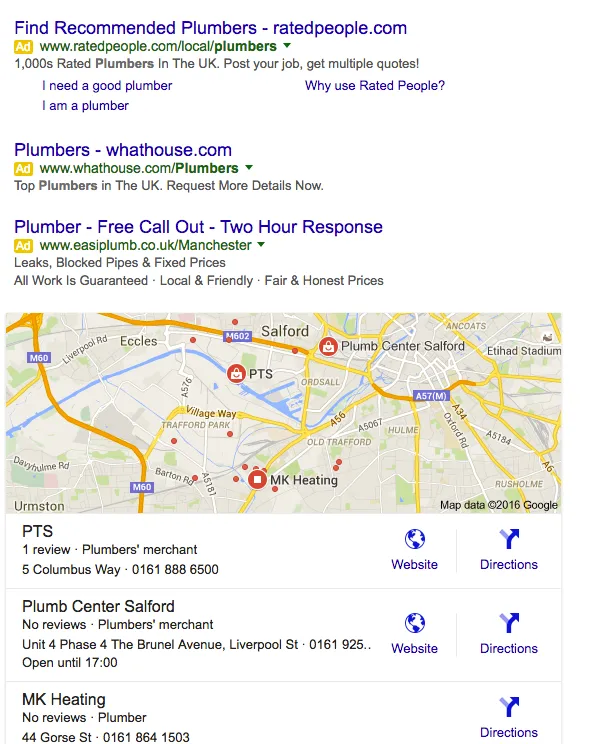
By interpreting SEO keyword advice as good PPC advice you’re potentially damaging your campaign. So please just don’t blindly follow the keyword research guides suggesting you create 100 different content pages to cover all those long tail keywords. Pages, that when all is said and done, won’t even convert.
The key here is specialist PPC keyword research. And that’s exactly what the this article is aimed at.
Want to know the right way to do your PPC keyword research?
Read on…
How to guarantee that you are using the very best keywords for your PPC campaigns?
This is what we’ll cover:
Where to start
What tools you can use
Validating your keywords
Further refinements
Conclusion
Where to start
Before you dive straight in it’s important to place a little distance between you and your business or proposition – to try and take a more objective approach, to step into your customer’s shoes.
If you were them, what would you search for? What real world language would you enter into Google to help you find exactly what you want? Write down your ideas.
You may already have a keyword report. That’s fine, but work to supplement it with (ideally short) new keywords and phrases. Use an online synonym finder to help you out. Think of different turns of phrase, ways of expression to help you see your world through your prospect’s eyes.
Supposing your are selling ‘nike shoes’ (or any branded footwear) here is what you need to do:
Remove the brand and search for the synonyms (eg with thesaurus.com ) for ‘shoes’ or ‘t-shirts’ or etc to give you a list something like this:
shoes
trainers
footwear
sneakers
loafers
When you think you are ready than you can check competitor pages; the main menu structure and especially the title and meta description part of the source of the page. You’ll usually find their their main target keywords there.

Remember we are looking for short enough keywords to describe your solutions, services or products. In the example above ‘It support London’, ‘Business Intelligence’ & ‘It Consultancy’ seems promising and should be noted for further reference.
Sometimes you could find a very detailed menu structure relating to the different products as below for SSL Certificates.
Beside the brand name the different types of SSLs here make this a very useful list of potential keywords.
The services above would appear viable targetable terms for a PR Agency (this is a screenshot of the services from a PR Agency in London). Whether you are a PR Agency in Manchester, a Pr Agency in London or a PR Agency from anywhere else in the country for that matter, there are often new and relevant keywords opportunities to discover.
Identify around 30-50 keywords. These will become your seed keywords and set your up for the next step.
Note: Keywords and services can be very different in the US. Of course it’s perfectly possible to learn from businesses in other countries, but it’s possible you may end up with some irrelevant terms.
The best tools to use.
The first and best known names on the tools list are Google Keyword Planner and Bing’s keyword research. Great tools, of that there’s no doubt, but let me caution you against overestimating their capabilities.
(I’ll spare you the detailed instructional on Google Keyword Planner. A quick search will turn up tons of guides telling you how to use it and what inputs and settings you can make).
The issue here is that all these tools will inevitably give you keywords that are too broad with Google overestimating its ability to match up keywords and user intent.
Be suspicious.
Be very suspicious when your gut tells you a keyword makes little or no sense:
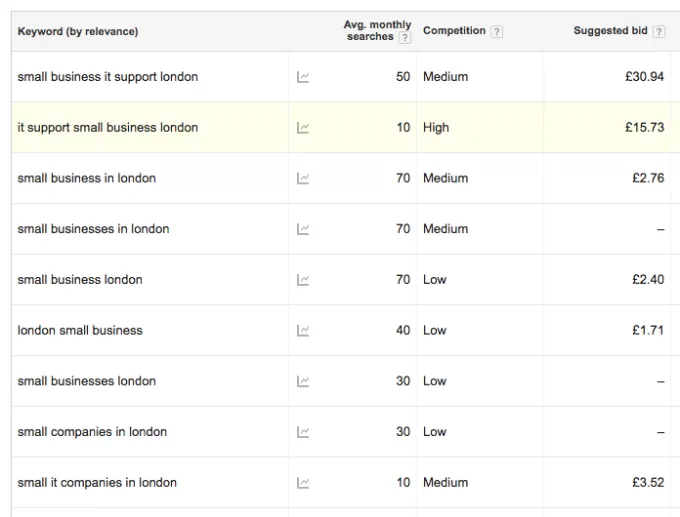
The example above offers suggestions after an analysis of an IT support company’s landing page. Both ‘small business in london’ and ‘small businesses in london’, have nothing to do with IT support. They’re not even close and will cost you money.
If you only take away one thing from this document, make it this:
There is a reason why the suggested bid for one keyword is £30 and another’s £3.
It’s because the cheaper keyword is unlikely to be worth bidding for – it’s a non transactional keyword. A keyword where people are looking for a specific piece of information rather than a specific service or product.
If your seed keyword costs £30 it’s very unlikely that you will find a good keyword for £3 to deliver you equivalent traffic and conversion rates. Yes you can spend 90% less on a cheaper keyword but will it get you results? Probably not.
Great results are the product of smart PPC research , NOT penny pinching or thinking you can get something for nothing.
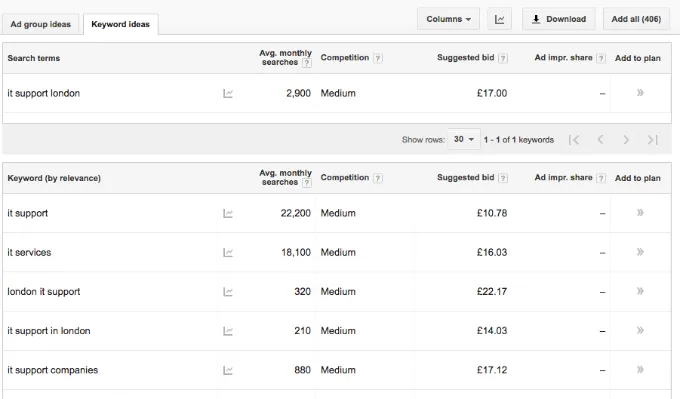
If your seed keyword is ‘it support’ then ‘it services’, ‘it support london’, ‘it support in london’ etc chances are you will get the results you need for your PPC campaign. (Sadly for the similar amount of money that you needed for ‘it support’).
Remember, although specific keywords and phrases are sometimes relatively expensive they are usually worth bidding for, eg: ‘it support companies’ or ‘best it support companies’ are more expensive than ‘it support’ because they has a higher value of service fee behind them.
Luckily Google keyword planner is not the only the tool available. Use a keyword research tool like SEMRush to find out the exact keywords your competitors are bidding for.
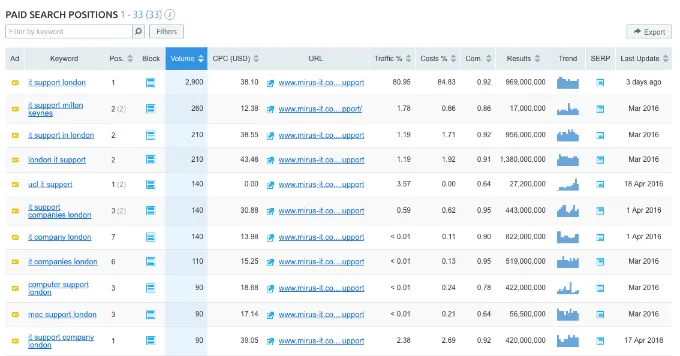
If you check 8-10 competitors’ domains you’ll quickly build a large list of keywords. Don’t just blindly copy them though, you never know, it might be poorly setup. Beware especially suspicious of taking inspiration from short term campaigns or campaigns with large fluctuations in data as below
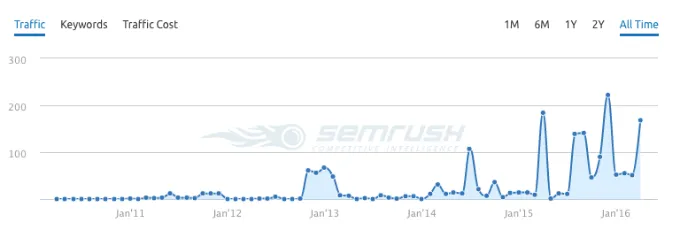
As you can see this company bid for the keyword: ‘ucl it support’ which is related to University College London It support and not used by companies looking for IT support in London, so ‘ucl’ should be a negative keyword expression NOT a keyword expression that would make sense for an IT support company PPC campaign.
Back to our other example, the PR Agency, you’ll find tons of great keyword ideas like:
london fashion pr agencies
sports pr agencies london
travel pr agency
Don’t though use everything you found here. Avoid queries like:
what does a pr company do
what is a pr agency
what is digital pr
Keyword expressions that start with ‘what is’ and ‘ what does ’ are informational queries not transactional, so again, I suggest adding them as a negative keyword rather than a positive one. More suggestions about negative keywords, please visit our previous blog post:
Must have negative keywords for ppc search campaigns 1.
Validating your keywords
OK – so hopefully by now you should have a list of at least 150-200 contender keywords. Before you go any further though, there is a final important part of your keyword research to complete. Your keyword validation.
Vital validation that most SEO keyword research guides forget to mention . And the reason that businesses can end up with 100s of articles and 0 conversions.
In the world of PPC a lack of validation will see you quickly burn through budgets with little, if anything, to show for it – clicks cost, make them count!!
These are the results for ‘it support london’
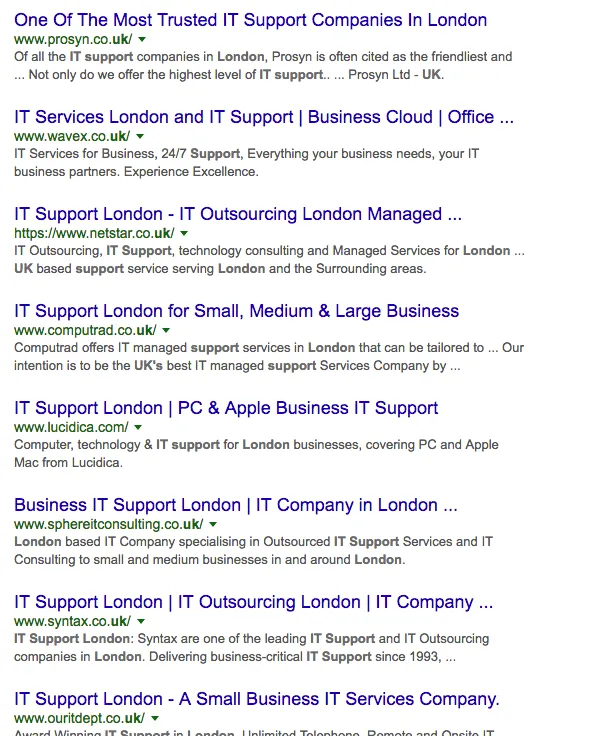
and this is the search result for ‘it support analyst london’
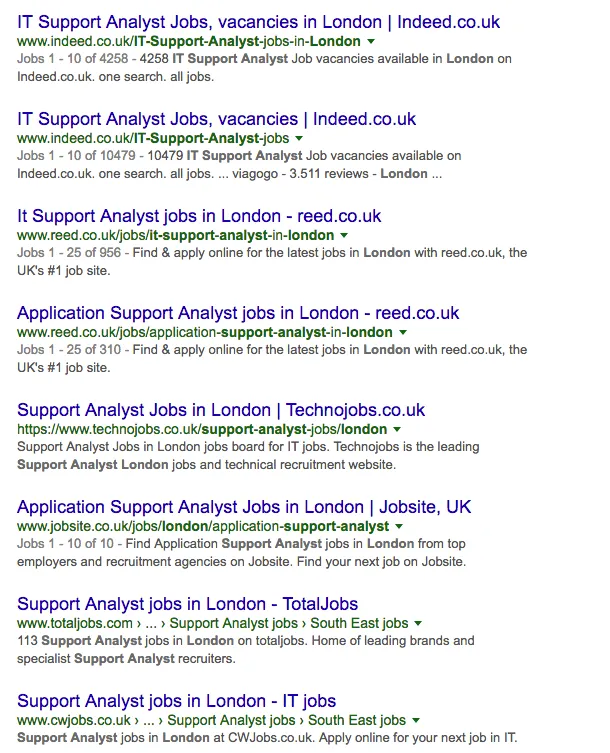
As you can see for the second query there are only job listings, not IT support companies. Bottom line? A single word included or excluded can drastically impact performance for better OR for worse.
And the same applies to ‘it support london salary’, ‘it support apprenticeship london’, ‘it support roles london’.
Further refinements:
Always test your keywords against the search result page on Google. Why? To make sure you are targeting the right audience. Also you can get additional ‘Searches related…’ ideas from Google at the bottom of the page.
As you can see below it’s perfectly possible to be more specific when you’d like to target ‘it support manchester’ as people are searching for ‘it support stockport’, ‘it support oldham’ etc.
So… if you are a solution provider in a larger city it might be wise to add nearby areas or districts.
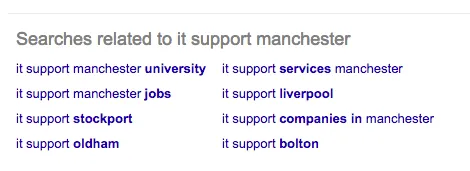
Even if your search term is not area based you can still usually find plenty of keywords to consider in the related searches area.
Conclusion
Keyword research for PPC is chalk. Organic SEO keyword research is cheese. Be wary of the vast majority of keyword articles out there as most fail to properly address PPC. Focused on generating content for SEO purpose they’re designed to help generate fresh PPC business.
Bear in mind too that short keywords and keyword phrase are powerful – they work. It’s how people tend to use the search engines when they want something in a hurry. Rather than type a whole sentence to find a service they just type the minimum amount necessary find a solution or a product.
Struggling to find better converting keywords for your business?
Wonder whether your PPC could perform better?
Contact Us. We’ll tell you everything you need to know.


![AI Advertising in 2025: Real ROI vs Expensive Hype [Guide]](/_ipx/f_webp/img/blog/blog-ai-in-the-advertising-space.jpg)
